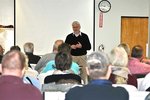NARROWSBURG — Many Sullivan County residents and emergency management services are waiting to get more communication towers for cell phone reception.
The Upper Delaware Council addressed that …
This item is available in full to subscribers.
Please log in to continue |


NARROWSBURG — Many Sullivan County residents and emergency management services are waiting to get more communication towers for cell phone reception.
The Upper Delaware Council addressed that concern in a recent workshop at Tusten Town Hall, where three speakers talked about industry experience, stating modern development needs to be balanced with the impact cell towers can have on local communities and environment, especially near the protected river.
Speakers were Orange County Planning Commissioner David Church, Pennsylvania State Police Broadband Services Manager Frank Yoder, and telecommunications expert Dick Comi, co-owner of The Center for Municipal Solutions. About 40 local government officials attended the session, which was also open to residents.
Church said that historically, local zoning codes have not addressed cell tower zoning and that the federal government already has legislation about it, adding, “There's still a role for local government but you're constrained in some ways.… You will get no modern business activity without telecommunications as part of the public infrastructure. It's essential.”
He recommended that communities start by identifying and mapping their most important natural resources. “What is it that you care about? You need to get consensus on that,” he said. If a community decides to use zoning, definitions, purpose, and application process need to be defined.
Yoder, whose network largely completed the construction of 250 towers throughout Pennsylvania to improve high-speed Internet connections, said, “We recognize in public safety that these things are ugly. There's no way around it. It's certainly within the right of the community or region to ask for things that minimize visual impact.”
He explained that painting monopoles gray, white, or light blue tends to make them less noticeable.
Yoder suggested that communities hire a consultant to represent their interests in navigating through the complex, multi-agency process required under the National Environmental Policy Act.
Comi noted that AT&T announced that it plans to install 50,000 more tower sites throughout the country. “It's the largest infrastructure development going on right now,” he explained, continuing, “We won't see towers going away in our lifetime, but we will continue to see upgrades in technology.… Eventually there won't be any landlines for residential users. The usage is going to wireless.”
He listed what towns can't do regarding the towers: Discriminate among service providers; prohibit towers (zone out) in a community; take an unreasonable amount of time to make a determination; deny an application if they verifiably meet the federal regulations for radiofrequency (RF) emissions; and deny an application without a substantial written record.
However, towns can decide where towers are sited, what they look like, and lighting, screening, and setback requirements through local laws.
Comi advised hiring an attorney with experience in the field. He also listed the sources of revenue that can be collected from wireless applicants, including site facility rentals, application fees for municipalities' costs, and determining assessed value.
Many in the audience are not confident the wireless companies are interested in the sparsely populated area. Comi said the volume generation of voice and data usage comes more from the traffic on the roads than the number of people in the homes.
“You've got a very pristine area, folks. You better damn well protect it because the industry is going to come in eventually,” Comi warned. “Look out because they will put their towers where they want them, not where you want them. Protect your communities,” he concluded.
Comments
No comments on this item Please log in to comment by clicking here